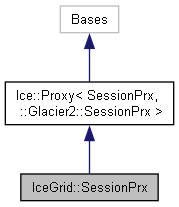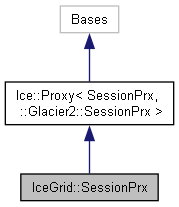|
| ::std::shared_ptr<::Ice::ObjectPrx > | allocateObjectById (const ::Ice::Identity &id, const ::Ice::Context &context=::Ice::noExplicitContext) |
| | Allocate an object. More...
|
| |
| ::std::function< void()> | allocateObjectByIdAsync (const ::Ice::Identity &id, ::std::function< void(::std::shared_ptr<::Ice::ObjectPrx >)> response, ::std::function< void(::std::exception_ptr)> ex=nullptr, ::std::function< void(bool)> sent=nullptr, const ::Ice::Context &context=::Ice::noExplicitContext) |
| | Allocate an object. More...
|
| |
| template<template< typename > class P = ::std::promise> |
| auto | allocateObjectByIdAsync (const ::Ice::Identity &id, const ::Ice::Context &context=::Ice::noExplicitContext) -> decltype(::std::declval< P<::std::shared_ptr<::Ice::ObjectPrx >>>().get_future()) |
| | Allocate an object. More...
|
| |
| ::std::shared_ptr<::Ice::ObjectPrx > | allocateObjectByType (const ::std::string &type, const ::Ice::Context &context=::Ice::noExplicitContext) |
| | Allocate an object with the given type. More...
|
| |
| ::std::function< void()> | allocateObjectByTypeAsync (const ::std::string &type, ::std::function< void(::std::shared_ptr<::Ice::ObjectPrx >)> response, ::std::function< void(::std::exception_ptr)> ex=nullptr, ::std::function< void(bool)> sent=nullptr, const ::Ice::Context &context=::Ice::noExplicitContext) |
| | Allocate an object with the given type. More...
|
| |
| template<template< typename > class P = ::std::promise> |
| auto | allocateObjectByTypeAsync (const ::std::string &type, const ::Ice::Context &context=::Ice::noExplicitContext) -> decltype(::std::declval< P<::std::shared_ptr<::Ice::ObjectPrx >>>().get_future()) |
| | Allocate an object with the given type. More...
|
| |
| void | keepAlive (const ::Ice::Context &context=::Ice::noExplicitContext) |
| | Keep the session alive. More...
|
| |
| ::std::function< void()> | keepAliveAsync (::std::function< void()> response, ::std::function< void(::std::exception_ptr)> ex=nullptr, ::std::function< void(bool)> sent=nullptr, const ::Ice::Context &context=::Ice::noExplicitContext) |
| | Keep the session alive. More...
|
| |
| template<template< typename > class P = ::std::promise> |
| auto | keepAliveAsync (const ::Ice::Context &context=::Ice::noExplicitContext) -> decltype(::std::declval< P< void >>().get_future()) |
| | Keep the session alive. More...
|
| |
| void | releaseObject (const ::Ice::Identity &id, const ::Ice::Context &context=::Ice::noExplicitContext) |
| | Release an object that was allocated using allocateObjectById or allocateObjectByType. More...
|
| |
| ::std::function< void()> | releaseObjectAsync (const ::Ice::Identity &id, ::std::function< void()> response, ::std::function< void(::std::exception_ptr)> ex=nullptr, ::std::function< void(bool)> sent=nullptr, const ::Ice::Context &context=::Ice::noExplicitContext) |
| | Release an object that was allocated using allocateObjectById or allocateObjectByType. More...
|
| |
| template<template< typename > class P = ::std::promise> |
| auto | releaseObjectAsync (const ::Ice::Identity &id, const ::Ice::Context &context=::Ice::noExplicitContext) -> decltype(::std::declval< P< void >>().get_future()) |
| | Release an object that was allocated using allocateObjectById or allocateObjectByType. More...
|
| |
| void | setAllocationTimeout (int timeout, const ::Ice::Context &context=::Ice::noExplicitContext) |
| | Set the allocation timeout. More...
|
| |
| ::std::function< void()> | setAllocationTimeoutAsync (int timeout, ::std::function< void()> response, ::std::function< void(::std::exception_ptr)> ex=nullptr, ::std::function< void(bool)> sent=nullptr, const ::Ice::Context &context=::Ice::noExplicitContext) |
| | Set the allocation timeout. More...
|
| |
| template<template< typename > class P = ::std::promise> |
| auto | setAllocationTimeoutAsync (int timeout, const ::Ice::Context &context=::Ice::noExplicitContext) -> decltype(::std::declval< P< void >>().get_future()) |
| | Set the allocation timeout. More...
|
| |
| ::std::shared_ptr< SessionPrx > | ice_adapterId (const ::std::string &id) const |
| | Obtains a proxy that is identical to this proxy, except for the adapter ID. More...
|
| |
| ::std::shared_ptr< SessionPrx > | ice_batchDatagram () const |
| | Obtains a proxy that is identical to this proxy, but uses batch datagram invocations. More...
|
| |
| ::std::shared_ptr< SessionPrx > | ice_batchOneway () const |
| | Obtains a proxy that is identical to this proxy, but uses batch oneway invocations. More...
|
| |
| ::std::shared_ptr< SessionPrx > | ice_collocationOptimized (bool b) const |
| | Obtains a proxy that is identical to this proxy, except for collocation optimization. More...
|
| |
| ::std::shared_ptr< SessionPrx > | ice_compress (bool b) const |
| | Obtains a proxy that is identical to this proxy, except for its compression setting which overrides the compression setting from the proxy endpoints. More...
|
| |
| ::std::shared_ptr< SessionPrx > | ice_connectionCached (bool b) const |
| | Obtains a proxy that is identical to this proxy, except for connection caching. More...
|
| |
| ::std::shared_ptr< SessionPrx > | ice_connectionId (const ::std::string &id) const |
| | Obtains a proxy that is identical to this proxy, except for its connection ID. More...
|
| |
| ::std::shared_ptr< SessionPrx > | ice_context (const ::Ice::Context &context) const |
| | Obtains a proxy that is identical to this proxy, except for the per-proxy context. More...
|
| |
| ::std::shared_ptr< SessionPrx > | ice_datagram () const |
| | Obtains a proxy that is identical to this proxy, but uses datagram invocations. More...
|
| |
| ::std::shared_ptr< SessionPrx > | ice_encodingVersion (const ::Ice::EncodingVersion &version) const |
| | Obtains a proxy that is identical to this proxy, except for the encoding used to marshal parameters. More...
|
| |
| ::std::shared_ptr< SessionPrx > | ice_endpoints (const ::Ice::EndpointSeq &endpoints) const |
| | Obtains a proxy that is identical to this proxy, except for the endpoints. More...
|
| |
| ::std::shared_ptr< SessionPrx > | ice_endpointSelection (::Ice::EndpointSelectionType type) const |
| | Obtains a proxy that is identical to this proxy, except for the endpoint selection policy. More...
|
| |
| ::std::shared_ptr< SessionPrx > | ice_fixed (const ::std::shared_ptr<::Ice::Connection > &connection) const |
| | Obtains a proxy that is identical to this proxy, except it's a fixed proxy bound the given connection. More...
|
| |
| ::std::shared_ptr< SessionPrx > | ice_invocationTimeout (int timeout) const |
| | Obtains a proxy that is identical to this proxy, except for the invocation timeout. More...
|
| |
| ::std::shared_ptr< SessionPrx > | ice_locator (const ::std::shared_ptr<::Ice::LocatorPrx > &locator) const |
| | Obtains a proxy that is identical to this proxy, except for the locator. More...
|
| |
| ::std::shared_ptr< SessionPrx > | ice_locatorCacheTimeout (int timeout) const |
| | Obtains a proxy that is identical to this proxy, except for the locator cache timeout. More...
|
| |
| ::std::shared_ptr< SessionPrx > | ice_oneway () const |
| | Obtains a proxy that is identical to this proxy, but uses oneway invocations. More...
|
| |
| ::std::shared_ptr< SessionPrx > | ice_preferSecure (bool b) const |
| | Obtains a proxy that is identical to this proxy, except for its endpoint selection policy. More...
|
| |
| ::std::shared_ptr< SessionPrx > | ice_router (const ::std::shared_ptr<::Ice::RouterPrx > &router) const |
| | Obtains a proxy that is identical to this proxy, except for the router. More...
|
| |
| ::std::shared_ptr< SessionPrx > | ice_secure (bool b) const |
| | Obtains a proxy that is identical to this proxy, except for how it selects endpoints. More...
|
| |
| ::std::shared_ptr< SessionPrx > | ice_timeout (int timeout) const |
| | Obtains a proxy that is identical to this proxy, except for its connection timeout setting which overrides the timeot setting from the proxy endpoints. More...
|
| |
| ::std::shared_ptr< SessionPrx > | ice_twoway () const |
| | Obtains a proxy that is identical to this proxy, but uses twoway invocations. More...
|
| |
A session object is used by IceGrid clients to allocate and release objects.
Client sessions are created either via the Registry object or via the registry client SessionManager object.
- See also
- Registry


 Public Member Functions inherited from Ice::Proxy< SessionPrx, ::Glacier2::SessionPrx >
Public Member Functions inherited from Ice::Proxy< SessionPrx, ::Glacier2::SessionPrx >